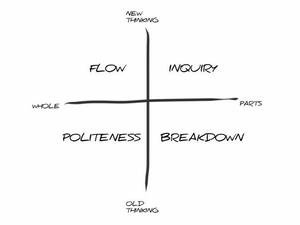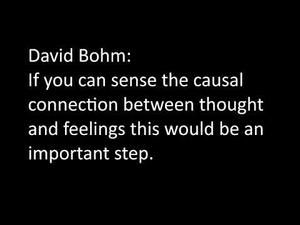

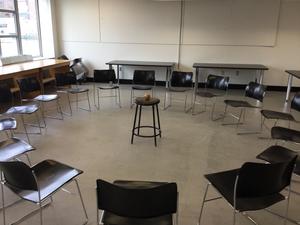
Thought is a system belonging to the whole culture and society, evolving over history, and it creates the image of an individual who is supposed to be the source of thought. It gives the sense of an individual who is perceived and experienced. This would be conducive to the next step, which is for thought to claim that it only tells you the way things are and then the individual inside decides what to do with the information—he chooses. This is the picture which emerged gradually; thought tells you the way things are, and then “you” choose how to act from that information.
In a dialogue, each person does not attempt to make common certain ideas or items of information that are already known to him. Rather, it may be said that the two people are making something in common, i.e., creating something new together.

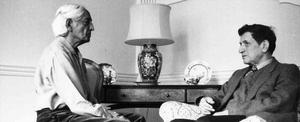
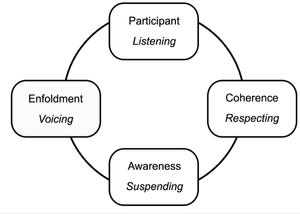



"In this large group we are not going to decide what to do about anything. This is crucial. Otherwise we are not free. We must have an empty space where we are not obliged to do anything, nor to come to any conclusions, nor to say anything or not say anything. It's open and free. It's an empty space. 'Occupied' is the opposite of leisure; it's full. So we have here a kind of empty space where anything may come in - and after we finish, we just empty it. We are not trying to accumulate anything. That's one of the points about a dialogue. As a friend of mine used to say, "The cup has to be empty to hold something.""
"Now, the way we start a dialogue group is usually by talking about dialogue - talking it over, discussing why we're doing it, what it means, and so forth. I don't think it is wise to start a group before people have gone into all that, at least somewhat. You can, but then you'll have to trust that the group will continue, and that these questions will come out later. So if you are thinking of meeting in a group, one way which I suggest is to have a discussion or a seminar about dialogue for awhile, and those who are interested can then go on to have the dialogue. And you mustn't worry too much whether you are or are not having dialogue - that's one of the blocks. It may be mixed.
A basic notion for a dialogue would be for people to sit in a circle. Such a geometric arrangement doesn't favour anybody; it allows for direct communication. In principle, the dialogue should work without any leader and without any agenda. Of course, we are used to leaders and agendas, so if we were to...
"The collective thought is more powerful than the individual thought. In fact, the individual thought is mostly the result of collective thought and of interaction with other people. The language is entirely collective, and most of the thoughts in it are. Everybody does his own thing to those thoughts - he makes a contribution. But very few change them very much."
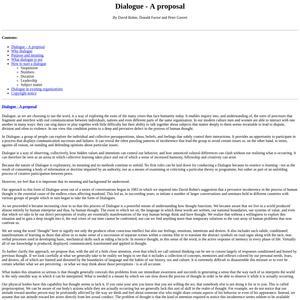
Krishnamurti: Sir, how shall we start this?
David Bohm: I understand you have something to say.
K: On lots of things but I do not know how to start it.
DB: Oh.
K: Sir, I would like to ask if humanity has taken a wrong turn.
DB: A wrong turn? Well, it must have done so, a long time ago, I think.
K: That is what I feel. A long time ago mankind must have turned.
DB: Yes.
K: I am just enquiring.
DB: It appears that way.
K: It appears that way - why? You see, as I look at it, mankind has always tried to become something - the becoming.
DB: Well possibly. You see I think that, you know, I was struck by something I read a long time ago about man going wrong when he began to be able to plunder and take slaves about five or six thousand years ago. And then after that the main purpose of existence was to just exploit and plunder and take slaves.
K: Yes, but the sense of inward becoming.
DB: Yes, so we should make it clear how this is connected. What kind of becoming was involved...
Bohm:
Well, I don’t know. I think that the first thing would have been to discuss with both the sole question of dialogue and try to make it clear to them and see if they would really appreciate the importance of it.
Wilkins:
What would happen if you came to each of the parties separately and said, “Look, these damn arguments have gone on along now for years.” You could say both of you are being sort of ridiculous.
Bohm:
But we’d talk around it. Dialogue with other people. Dialogue here, dialogue there, how important it is in this area, that area, how it works.
Wilkins:
Well, that’s one approach. I was thinking the other thing is you’d try and just bring them up in a joke and say, “Look, you people have been messing around for years like this. I mean you’ve got to do something.” Pull your socks up, for God’s sake.
Bohm:
You’ve got to combine it with a general theoretical approach, which suggests there’s something that can be done.
Bohm:
Yes, but anyway, whatever it was he didn’t take kindly to having — See, the point is, even if Krishnamurti could say, “Well, I think it’s probably nonsense, but let’s at least talk to the fellow. Let’s try to — perhaps he needs help or whatever? But let’s have a talk about it, right? Therefore, this approach of cherishing the other person’s idea is important, to say I will go through a period when I will really listen to your idea tentatively and really try to go over it in my mind and try to see why you think that way and what attracts you to it, and see if I can even do better than you in presenting it. If they are both doing this then I think something new will happen.
Bohm:
Yes, and that’s the point that Schumacher made very strongly with me. When he tried to bring it up with Krishnamurti, Krishnamurti wouldn’t really have any of it. I remember discussion — Donald was trying to say the word is the thing in a certain area because in certain areas the meaning of the word is the essential point. You see, the way you use words will contribute essentially to your emotional state, to anger and fear and so on. Now, when it comes to some object out here, the word is not the thing. Now, Krishnamurti kept on repeating, “The word is not the thing,” at that time. Now, Schumacher objected and said the word is the thing. Krishnamurti wouldn’t listen. The point is the dialogue broke down there. Both sides were too strong in presenting their position, once again. Although Schumacher was trying to establish dialogue, at one stage the emotional pressure of this takes hold of both sides. If you say the word is not the thing and I say you must be making a mistake,...
I brought them together and so on. I thought maybe Krishnamurti could help it, but it turned out he didn’t, and it may have made it worse. So you can see that there are many questions of communication that were involved all around Bohr and Einstein, and between Donald and Krishnamurti, and so on. So I became very interested in this question of language through all of this, even before all of this had happened, and I could see that this question of the use of language must play a big part. In fact, Heisenberg and Bohr had set physics off in this mathematical usage of language saying that the essence of science is in the equations, and that mathematics just satisfies equations, then he pictures are no longer possible. That was totally against Einstein’s way of using language, and of course, a great many other physicists, including myself. I felt that there was something in what Einstein, and there was something in what Bohr said, and we had to somehow include both and get beyond both....
Well, they weren’t doing a dialogue. They were not discussing the point which was the unconscious assumption, or even conscious. But they did not discuss their assumptions. They argued by saying, “This is my assumption. This is my result.” They did not get together and say, “Here are our two assumptions. Let me look at your assumption as favorably as I can, and you look at mine.”
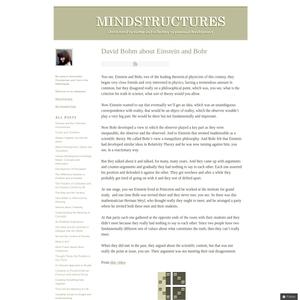
8 months ago
